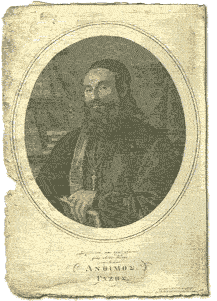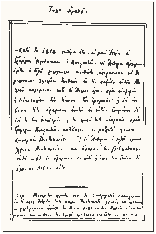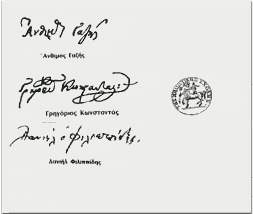
Etching of Anthimos Gazis from the title page of his Greek Dictionary (Venice, 1809)
The famous scholars Gazis, Konstantas and Philippides were born in Milies in the 1750s, when the area of Pelion was starting to flourish as a result of the development of trade and the handicraft industry and of increased business relations with Europe. Extensive traveling and studies in Europe gave the three men the opportunity of becoming familiar with the liberal ideas of the Enlightment and of contributing to the intellectual and political uprising of their homeland. Gazis, Konstantas and Philippides, all three of them clerics, teachers, writers, translators, publishers, members of the revolutionary group Philiki Etaireia (Friendly Society) and founders of the School of Milies, are among the most eminent personalities of the Greek Enlightment.

The stamp of the School of Milies and the signatures of the three scholars.
The three scholars had the dream of founding a school in their homeplace. From abroad, Gazis and Filippides wrote and encouraged their fellow villagers to offer their moral and financial support. Gazis in Vienna secured contributions from Greeks living abroad and Philhellenes, purchased books, maps and equipment for the School. Konstantas supervised the construction of the School's. The official opening of the School took place on August 6, 1815 and Konstantas became its director.
The School of Milies became renowned for its high standard of teaching, offering a curriculum including the applied sciences (with the use of up-to-date equipment), and for its very rich library - possibly of more than 10,000 volumes in its heyday.

Gazis returned from Vienna in 1817 to teach at the School with Konstantas and also to organize the revolution against the Turkish rule in the area. The School operated until 1821, when the Greek War of Independence broke out. Gazis proclaimed the beginning of the struggle for freedom in Milies, on May 7, 1821. The uprising in Pelion was however to fail and as a result of this Gazis and Konstantas fled to the Greek mainland, while the School suffered severe damage and a lot of books, maps and scientific instruments were lost. In 1834 Konstantas returned to Milies and taught again at the School until his death in 1844. The School then closed until Thessaly's liberation in 1881, when the village elementary school was housed there. The building was destroyed in 1943 when the German occupations troupes set fire to the village of Milies.
Text : Rania Tzortzi
Translated by Hara Mihalakopoulou
